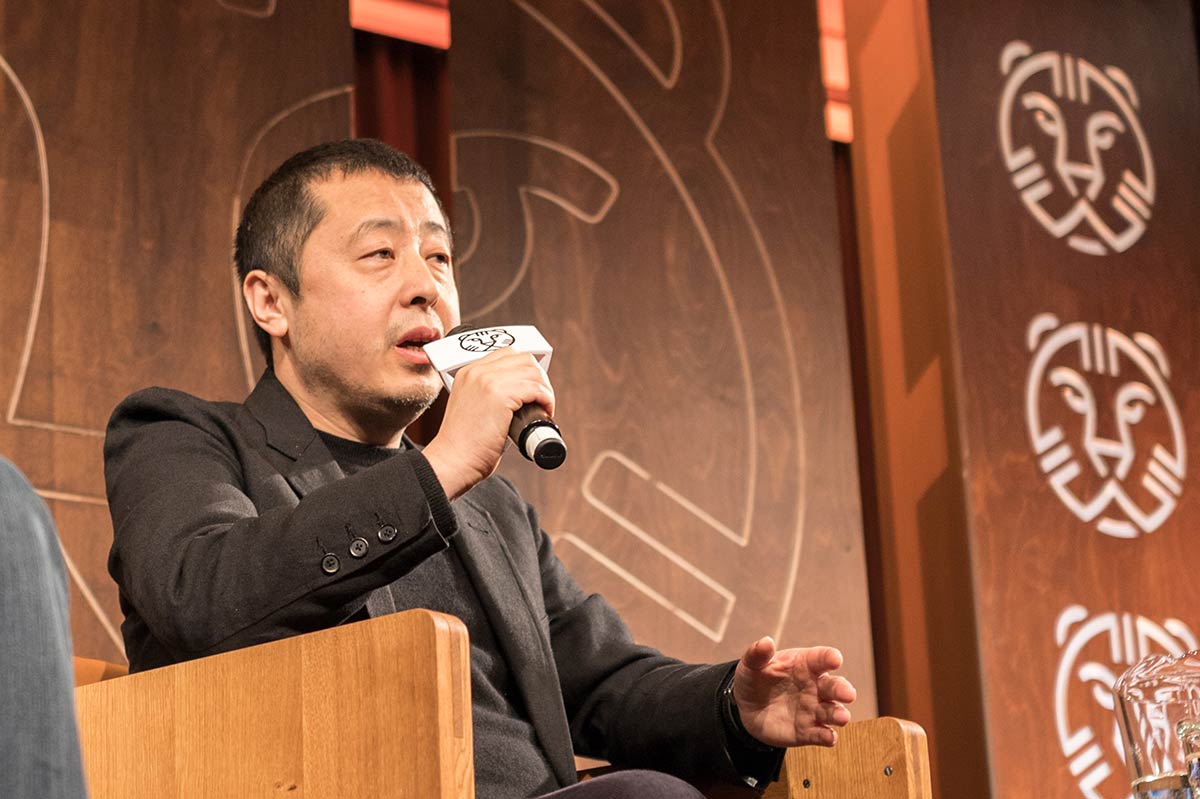This week IFFR is holding a wide programme of Masterclasses at Le Jardin Hilton in central Rotterdam. We’ll be bringing coverage of cinematic luminaries including Claire Denis, Jia Zhang-ke, and Cliff Martinez, as they recount the defining moments in their careers to date.
Jia Zhang-ke is a filmmaker concerned with time: how it disorientates, deceives, and hollows out the individual. Modernity wreaks irreparable transformations; technology delivers distortions of experience; globalization oppresses consciousness and the self. Concrete soaks into his bucolic landscapes — the past and present alchemize. Zhang-ke captures these temporal aberrations, gaps in which the material life of Chinese citizens clashes with the relentless economic ambition of the Chinese state. Leading the ‘sixth generation’ of Chinese filmmakers, Zhang-ke practices cool conduct, a culture of distance that exposes — or allows the viewer to expose — the interior lives of rural China. He is a generous directorial presence, one who allows the audience to project their own experiences. Counter that spirit, Zhang-ke’s Masterclass during IFFR 2019 ran over, so crowd contributions were forfeited.
Moderated by IFFR stalwart Tony Rayns (amiable, poor timekeeper), the Masterclass gave an introduction to Zhang-ke’s career, notably his early films “Pickpocket,” “Platform,” and “Unknown Pleasures,” all of which focus on aspects of his rural upbringing in Shanxi province. His later work — now with an ambivalent endorsement from the Chinese state — has grown in both narrative scope and visual intimacy. “Still Life,” “A Touch of Sin,” and the recent “Ash Is Purest White” provide critical commentary on rapid industrial changes taking place over several decades. China is shown in its new-money grandeur and expansiveness. Dilapidated mines close while cavernous stadia are built. Fresh construction projects frame profound loneliness, a sense of being diminished, of being shrunken into the earth. In what was less didactic address, more overview, diminutive Zhang-ke revealed the cinematic habits and experiences that shape his work, as interpreted through a translator.
Starting out, Zhang-ke worked as an independent filmmaker outside the purview of the Chinese state. In the ‘90s he was a student of the Beijing Film Academy, but first studied cinema from an academic rather practical perspective.
“I was 21 in 1991. In the ‘80s I was a big film fan and used to watch them in video parlors. I watched films from Hong Kong and Taiwan, films you couldn’t watch in Chinese cinemas at the time. China was undergoing momentous changes in the ‘90s
I started writing poetry and stories and then I got introduced to the arts. Chen Kaige’s “Yellow Earth” was the film that made me realize I realize I could be a director. The film is situated in a place where there is loss. These were people I was familiar with. Although it was set in 1940s, it resonated with me — it was consistent with the people I knew and my experiences. It made it possible that someone from my background could become a film director.”
“When I resolved to become a film worker, I started making inquiries to the film academy in Beijing. But you first have to take an exam and I didn’t know what I had to study — there were very few books on cinema. I thought cameramen were wizards of light, so I applied but the requirement was to be 1m 70 tall and I didn’t fit that. So we had a problem right there!”
“I didn’t dare apply for the directors section — they only admitted 12 people per year/ I didn’t have enough knowledge of film, so I applied for the film theory department.
They asked me about Jean-Luc Godard, but I hadn’t seen his films so I failed to pass. In 1993, I passed the test and discovered a new type of filmmaking was taking place in China. Directors had found money outside of the studio system, were financing films by themselves, and could shoot stories they wanted to shoot. One day in the library I discovered a book by Rainer Werner Fassbinder about how to budget your film. I thought, ‘Wow, this is terrific — I now must become an independent filmmaker.’ Together with my class, we organized a team and I made two shorts.”
Showing the extent of his ambition, Zhang-ke’s first ‘short’ was almost an hour long. Why was it important that his films were also made independently?
“I would say all my films are independent. The film club we formed in Beijing was called an experimental rather than an independent film group. We didn’t want to use conventional methods: the ways of filming from the ‘5th generation.’”
“I focused on a rural migrant worker for my first film, ‘Pickpocket.’ I wanted to find a new way of filming to express new revelations about life. I was excited to create a new type of main character. It is about somebody who is unable to go along with the times he lives in, who cannot adapt, who is completely natural and authentic. That’s why I started asking nonprofessional actors for my films. I cast one of my classmates who was also studying film theory. It was a rebellion against the body type of actors. Their body language, diction, pronunciation — all is trained. Even trained is the way they sit in a chair. I lean in my chair, and they sit up straight. I wanted to subvert that.”
“I think in my dialect and I use it when I write my scripts. We all have hometowns and dialects. When you have someone speaking Mandarin, where do they come from? They talk in a language without roots.”





